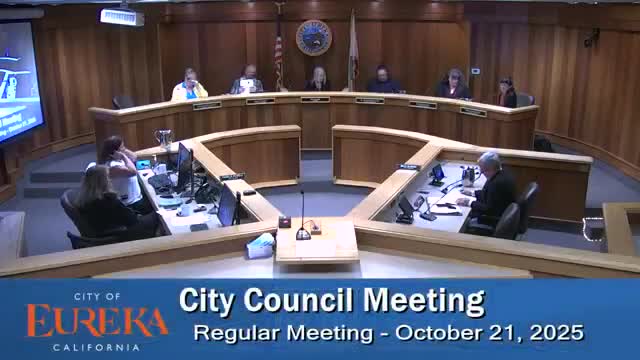Eureka council introduces tobacco retailer licensing ordinance and adds distance limits for new shops
Get AI-powered insights, summaries, and transcripts
Subscribe
Summary
On Oct. 21 the Eureka City Council introduced Bill 1051 CS to require tobacco retailer licensing, set an implementation date of Jan. 1, 2026 (with 90 days for businesses to comply), and add a new restriction barring new tobacco licenses within 600 feet of schools and within a quarter mile of existing retailers; the introduction passed 5-0.
EUREKA, Calif. — The Eureka City Council on Oct. 21 introduced a tobacco retailer licensing ordinance (Bill 1051 CS) that would require tobacco retailers to obtain a city license, give the city new enforcement tools and add geographic limits for new licenses.
The council approved introduction of the measure 5-0 after members added an amendment that would prevent the issuance of new tobacco-retailer licenses within 600 feet of schools or community centers and within a quarter-mile of an existing tobacco retailer.
What the ordinance would do
City Manager Slattery told the council the ordinance is designed to reduce minors’ access to flavored and other tobacco products, strengthen local enforcement and help meet public-health goals. “This is another ordinance that we’re recommending introduction of,” Slattery said. Staff recommended an effective date of Jan. 1, 2026 and a 90-day compliance window to allow businesses time to obtain required licenses.
Key provisions and recent edits
- Licensing and enforcement: The ordinance creates a local tobacco-retailer license administered by city code enforcement; violations can trigger license suspension or revocation and may be tied to related enforcement actions (for example violations of the nitrous ordinance could affect a retailer’s tobacco license).
- Definitions and limits: Earlier language limiting pharmacies was revised to reflect that no pharmacy-specific license renewals existed; the ordinance now contains a conditional-licensing pathway for prospective buyers to apply before closing so business sales are not automatically blocked.
- Geographic limit on new licenses: Council added an amendment prohibiting new tobacco-retailer licenses within 600 feet of any school or community center and within a quarter-mile of an existing tobacco retailer; existing legally operating retailers would continue as nonconforming uses and could seek licensing under the new rules.
- Fees and implementation: Staff told council the licensing fee will be set later and must reflect only the program’s costs; initial estimates discussed were in the low hundreds of dollars per license, with staff to return to council before Jan. 1, 2026 with a proposed fee schedule and implementation details.
Public comment and evidence presented
Public-health speakers supported the ordinance. Amber Weir, project director for NorCal for Health, thanked the council for advancing the issue and said youth-use rates in local surveys are higher than the state average. A public-health consultant cited a local retailer density figure: “Currently... the density of retailers in Eureka is about 3.25 retailers for 2,500 residents,” he said, adding that a goal often used is 2 retailers per 2,500 residents.
Local business owners urged targeted enforcement of bad actors rather than retroactive elimination of longstanding businesses; one convenience-store owner asked that enforcement focus on noncompliant retailers so long-standing community businesses are not unfairly penalized.
Action taken and next steps
Council Member Bauer moved to waive full reading and introduce Bill 1051 CS with the additional distance restrictions; Council Member Fernandez seconded. The motion carried on a 5-0 vote.
Staff said the ordinance would go into effect Jan. 1, 2026 and that businesses would have 90 days from that date to obtain licenses. The city will return with an implementation plan, a recommended fee schedule and administrative procedures for appeals and enforcement; staff indicated the matter will be coordinated with county efforts.
Ending
Council members said licensing and geographic limits are intended to reduce youth access to tobacco products while giving existing businesses a path to compliance; staff will return with fees and an implementation timeline ahead of the ordinance’s effective date.
